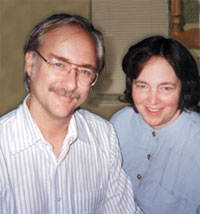Models for Understanding History
By Rob and Cyndy Shearer
Printed in Practical Homeschooling #16, 1997.
 The Shearers wonder if the human race is going uphill, downhill, or over the hill. Find out what difference this makes to your history studies
The Shearers wonder if the human race is going uphill, downhill, or over the hill. Find out what difference this makes to your history studies

|
 |
 Underlying every textbook and every historical work are a set of often un-acknowledged assumptions about how history works. Everyone who writes, reads, or thinks about history has a "model" in their mind which helps them to interpret and assemble the facts of history. These "models" can be sorted into three broad categories:
Underlying every textbook and every historical work are a set of often un-acknowledged assumptions about how history works. Everyone who writes, reads, or thinks about history has a "model" in their mind which helps them to interpret and assemble the facts of history. These "models" can be sorted into three broad categories:
Model A is the dominant model for historians in the 20th century. There is a widespread and almost unshakable belief that the history of mankind is a record of progress and that future prospects are for more of the same. There are a number of comforting implications that come with adopting this view. It's very flattering to oneself and one's contemporaries, since by implication everyone currently alive has made progress over all those folks who are dead. It also allows one to face the future with optimism, since as more time passes, more progress will be made. One can see this model clearly in the so-called "Whig" historians in England (for whom the English parliamentary democracy constituted the culmination of all of history) and in the 19th century German historians such as Hegel, who saw all of history leading up to its fulfillment in the unified German state of Bismarck with Kaiser Wilhelm.

Marxist historians use this model as well, seeing the past as the unfolding struggle between the classes in which first the bourgeoisie and then the proletariat triumph over the nobility. But of course, there is a great deal of American history written to fit this mold, too. Those who believe in an "evolving" Constitution see all change as positive and therefore, the more time, the more changes, the better our Constitution will be. It's a neat parlor game and anyone can play.
But there are other models. And the question is not which model is most comforting and reassuring, but which best fits the facts.
Many of the Greek and Roman historians subscribed to Model B. They looked back in the past and saw a "golden age" with fewer problems than their own. It seemed to them that things were getting worse over time and that the prospects for the future were grim. There is a certain sense in which this model fits the outlines of Scripture. We certainly haven't risen above the level of our first parents, Adam and Eve, so the broad line from Paradise can only trend downward. On the other hand, one can definitely trace progress and improvement through God's covenants with Noah, Abraham, Moses, and their fulfillment in Jesus. But against this, one must weigh the prophecies of Revelation which predict widespread war and tribulation prior to Jesus' return.
In truth, history is complicated. More complicated than the simple lines in Model A and Model B. It more closely resembles Model C. Periods of accomplishment are followed by periods of decay. In fact, "progress" is mostly a myth. There is nothing inevitable about it. The idea that the simple passage of time will allow things to improve flies in the face of experience. If you let time pass, will the dishes get washed, will rooms get cleaned, or will your car run better? The truth is that things deteriorate and decay with age.
The periods of progress and achievement are the exceptions and not the rule. There are remarkable periods scattered through history in which a group of men or a generation seem (perhaps supernaturally?) empowered to reverse the trends and to make remarkable achievements. Sometimes it is in literature, sometimes it is in science, sometimes it is in politics, sometimes it is in art or music. But inevitably, after a period of achievement, a long, slow period of decay sets in.
The Lesson of History
With this in mind, an analysis of the history of political institutions can be a little unsettling. The Greek city-states, in a burst of creativity around eight or nine hundred years before Christ, created a variety of city constitutions that served them admirably for generations. But over time, the cities seemed to become more and more unworkable and their leaders became corrupt. Eventually, most of the Greek cities were ruled by tyrants. They ended by being conquered first by the Macedonian armies of Alexander, and then by the Romans. The Romans likewise created an admirable republic about 500 b.c. But over time it developed more and more problems, and eventually succumbed to the military dictators who called themselves Emperors and gods.
The really interesting question, by the way, is not, "Why did the Roman Empire fall?" It is, "Why did the Roman Republic fall?" The fall from Republic through Empire to Dark Ages is sharply downward and continued for centuries. The Renaissance was a conscious rejection of the myth of progress. The writers, painters, and leaders of the Renaissance looked backward in time to men who were more accomplished than themselves. They wanted to reverse the trends of history and return to a better age. They strove to revive the Roman republic, Roman and Greek art, and in a surprisingly parallel movement, the Reformers wanted to revive and return to the New Testament church. The revival of the ancient world in the Renaissance continued for quite some time, and there is some truth in the assertion that the political thinkers of the 17th and 18th century (including the American founding fathers) were continuing the Renaissance and consciously trying to recreate the Roman republic. The famous statue of George Washington in the US capitol garbed in the toga of a Roman senator is no accident. The artist is making a deep and reflective comment on Washington's goals, aims, and understanding of history.
One of the questions worth pondering in our own day is, has there been progress or decay in our own civilization since the founders? Have we improved the republic or has it deteriorated and decayed? The answer to this question has far-reaching implications. If it has deteriorated, then we need to reverse directions and try to return to ideals of the founders, shedding the mistakes of later, lesser men. If we have progressed, why then, of course we need to continue correcting and eliminating the mistakes and omissions of the founders. Is our generation really more noble, admirable, and politically sophisticated than Washington, Madison, and Jefferson? That is a question we should be preparing our children to reflect on and begin to answer.
The trick is to get our students to move beyond the simple models and to think critically about whatever time period they are studying. Was this a period of achievement or decay? If they learn to step back and ask this question about the facts (and also about the views of the historians who are supplying the facts), they will have achieved a much more sophisticated understanding of our age. They will also have the ability to begin discerning what God may be doing in our day and how we should be praying, preparing, and participating in the great debates and movements of our time.